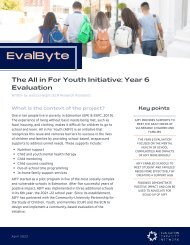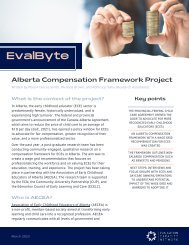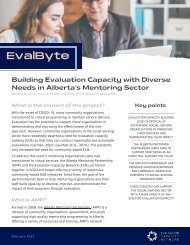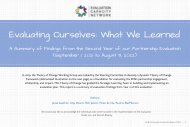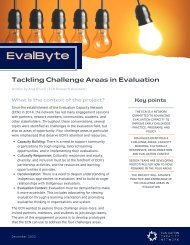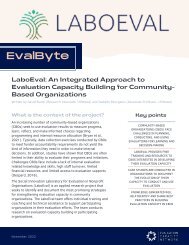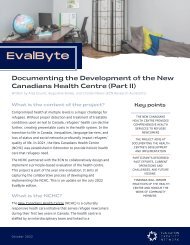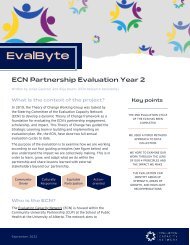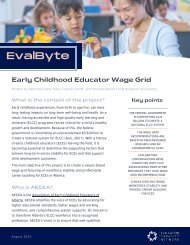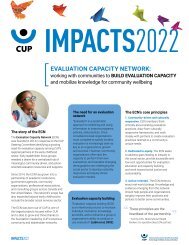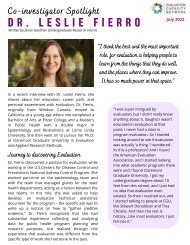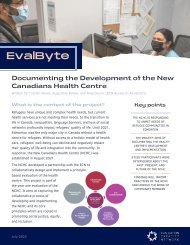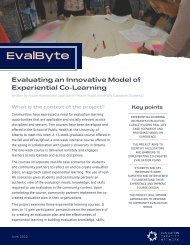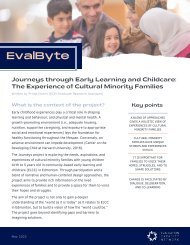Journeys through Early Learning and Childcare: Experiences of Ethnocultural Families (Part 2)
- No tags were found...
Create successful ePaper yourself
Turn your PDF publications into a flip-book with our unique Google optimized e-Paper software.
EvalByte<br />
<strong>Journeys</strong> <strong>through</strong> <strong>Early</strong> <strong>Learning</strong> <strong>and</strong> <strong>Childcare</strong>:<br />
<strong>Experiences</strong> <strong>of</strong> <strong>Ethnocultural</strong> <strong>Families</strong> (<strong>Part</strong> 2)<br />
Written by Prime Ilumin (ECN Research Assistant) <strong>and</strong> Pieter de Vos (ECN Postdoctoral Fellow)<br />
What is the context <strong>of</strong> the project?<br />
<strong>Early</strong> childhood experiences play a critical role in shaping<br />
learning <strong>and</strong> behaviour, <strong>and</strong> physical <strong>and</strong> mental health (Center<br />
on the Developing Child at Harvard University, 2016). Despite<br />
the importance <strong>of</strong> early learning <strong>and</strong> childcare (ELCC) in<br />
supporting healthy childhood development, many families<br />
experience challenges in obtaining appropriate support.<br />
Previous research has revealed the barriers ethnocultural<br />
families face in accessing affordable, high quality, <strong>and</strong> culturally<br />
responsive ELCC services in Edmonton.<br />
In January 2021, we launched the <strong>Journeys</strong> Project with the aim<br />
<strong>of</strong> building on previous studies by gathering rich firsth<strong>and</strong><br />
accounts <strong>of</strong> the experiences <strong>of</strong> ethnocultural parents with young<br />
children (birth to 5 years old) in ELCC in Edmonton.<br />
Through participation <strong>and</strong> a blend <strong>of</strong> narrative <strong>and</strong> humancentered<br />
design approaches, the project provides a space for<br />
them to voice their hopes <strong>and</strong> struggles <strong>and</strong> to build a vision <strong>of</strong><br />
how services could be improved.<br />
Key points<br />
THE RESEARCH BLENDS NARRATIVE<br />
AND HUMAN-CENTERED DESIGN<br />
APPROACHES TO GIVE A HOLISTIC<br />
VIEW OF THE EXPERIENCES OF<br />
ETHNOCULTURAL FAMILIES IN<br />
EARLY LEARNING AND CARE<br />
IT IS IMPORTANT FOR FAMILIES TO<br />
VOICE THEIR HOPES AND<br />
STRUGGLES—AND TO SHAPE<br />
SOLUTIONS<br />
THE RESEARCH HIGHLIGHTS THE<br />
SIGNIFICANCE OF EMPOWERING<br />
ETHNOCULTURAL PARENTS IN<br />
ELCC; SUPPORTING LANGUAGE<br />
AND CULTURE; FACILITATING<br />
INCLUSION AND BELONGING;<br />
IMPROVING ACCESS AND<br />
NAVIGATION; AND ADVANCING<br />
EQUITY<br />
Who are the project partners?<br />
The <strong>Journeys</strong> team at the ECN has partnered with the<br />
Multicultural Health Brokers Co-operative (MCHB) <strong>and</strong> the<br />
Edmonton Council for <strong>Early</strong> <strong>Learning</strong> <strong>and</strong> Care (ECELC). MCHB<br />
supports newcomers to Edmonton. Its mission is to improve<br />
January 2023
newcomer families’ health <strong>and</strong> well-being, <strong>and</strong> to<br />
encourage community-building so they can thrive<br />
<strong>and</strong> actively contribute to society. ECELC provides<br />
leadership in developing an integrated system <strong>of</strong><br />
high-quality ELCC services in Edmonton that<br />
particularly focuses on the needs <strong>of</strong> low-income<br />
<strong>and</strong> vulnerable families.<br />
What is the project working<br />
on?<br />
The <strong>Journeys</strong> Project engaged 30 parents from<br />
eight ethnocultural communities: Bhutanese;<br />
Chinese-speaking; Eritrean <strong>and</strong> Ethiopian, Filipino,<br />
Kurdish-speaking, Somali, <strong>and</strong> Spanish-speaking.<br />
Through focus groups <strong>and</strong> key informant<br />
interviews we inquired into their experiences in<br />
ELCC, seeking to identify common hopes <strong>and</strong><br />
concerns.<br />
We drew on these findings to develop detailed<br />
personas <strong>and</strong> composite stories that describe the<br />
journeys <strong>of</strong> ethnocultural families as they navigate<br />
ELCC services in Edmonton. Our approach was<br />
inspired by empathy <strong>and</strong> journey mapping<br />
processes that explore the emotional, mental, <strong>and</strong><br />
social experiences <strong>of</strong> individuals as they interact<br />
with a complex system. The composite stories we<br />
developed highlight experiences that are deeply<br />
personal <strong>and</strong> detailed, while also illuminating<br />
themes that emerged <strong>through</strong> our interviews <strong>and</strong><br />
focus groups.<br />
We explored how parents find out about childcare<br />
programs in the first place; how they register <strong>and</strong><br />
gain access to the programs; how they experience<br />
a typical day <strong>of</strong> juggling the challenges <strong>of</strong><br />
parenthood <strong>and</strong> <strong>of</strong> getting their children to a<br />
program. We also described their encounters<br />
with staff at the childcare program.<br />
While the stories bring attention to the struggles<br />
many families experience in accessing<br />
appropriate childcare, they also illuminate<br />
pathways for practice <strong>and</strong> policy improvements –<br />
<strong>and</strong> set the stage for further dialogue <strong>and</strong><br />
stakeholder engagement.<br />
The stories along with key insights <strong>and</strong><br />
recommendations have been compiled into an<br />
illustrated report that was shared with members<br />
<strong>of</strong> the ECELC along with some invited guests on<br />
December 16, 2022.<br />
Why is the project<br />
meaningful?<br />
The aim is to launch the <strong>Journeys</strong> report <strong>of</strong>ficially<br />
beginning <strong>of</strong> this year <strong>and</strong> to use the report as a<br />
springboard for strategic engagement with key<br />
stakeholders in ELCC <strong>through</strong>out 2023. Further<br />
work is also underway to roll out the research<br />
findings from the <strong>Journeys</strong> project that look<br />
specifically at the question <strong>of</strong> ‘quality’ from the<br />
perspective <strong>of</strong> ethnocultural families.<br />
Resources<br />
RAISED between Cultures: A Guidebook for<br />
Intercultural Practice in the <strong>Early</strong> Years<br />
Flight: Alberta's <strong>Early</strong> <strong>Learning</strong> <strong>and</strong> Care<br />
Framework<br />
Reference<br />
Center on the Developing Child at Harvard University. (2016). From best practices to break<strong>through</strong> impacts: A science-based approach to<br />
building a more promising future for young children <strong>and</strong> families. Retrieved from www.developingchild.harvard.edu<br />
Acknowledgment<br />
Special thanks to the Multicultural Health Brokers Co-operative <strong>and</strong> the Edmonton Council for <strong>Early</strong> <strong>Learning</strong> <strong>and</strong> Care for their<br />
contributions.<br />
January 2023
Eval<br />
Byte<br />
What is an EvalByte?<br />
The EvalByte series are snapshot overviews <strong>of</strong> the<br />
Evaluation Capacity Network's ongoing evaluation<br />
<strong>and</strong> research projects. Additional resources are also<br />
shared in these EvalBytes.<br />
Why you need to read it.<br />
Our EvalBytes will give you the opportunity to learn<br />
not only about our current projects, but<br />
also about<br />
our partners<br />
collaborative research<br />
evaluation practice<br />
community engagement



